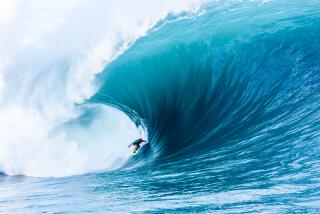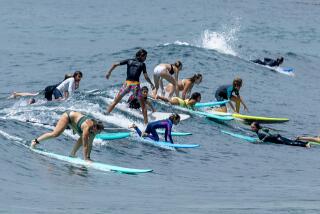British University Catches a Wave With Surfing Studies
- Share via
PLYMOUTH, England — Surfing evolved from sport to lifestyle in Hawaii, California and Australia. In chilly southwest England, it morphed into science.
Two years ago, the University of Plymouth rolled out a new four-year degree--surf science and technology.
Initially greeted with snickers and sneers about lightweight education, the program is now viewed as an innovation that may become a model for other unconventional degrees.
Eager students are tackling a broad range of course work selected with the input of a billion-dollar surfing industry--oceanography, business management, anatomy, environmental studies, meteorology and “materials technology and design construction,” a lab course devoted mostly to building surfboards.
Billabong and Quiksilver, two multinational surfboard and surf apparel companies, are keenly interested in the program, offering suggestions and field trips in exchange for recruiting the best students, Professor Malcolm Findlay says.
The promise of jobs after graduation fuels students’ enthusiasm. Graduates expect to see their earning potential rise from the meager hourly wages paid by surf shops to the comfortable salaries and benefits of the business world.
“There is a definite feeling that if we finish this degree, we will go on to work in the industry and push it forward,” says Rory Jordan, 24, one of 58 students in the program.
Jordan and his classmates bristle at any mention of the dimwitted surfer stereotype, although many dress the part--baggy clothes, various body piercings and hair disheveled by an early morning on the waves, where full-body wetsuits are a must and some students even wear neoprene hoods over their heads.
The second-year students, who call themselves the “guinea pigs,” are nearing the end of their core classes--no, there isn’t one on how to catch a wave--and are preparing for their first major project.
One hopes to build the first biodegradable surfboard, ditching the toxic resins and foams currently in use. Another sees promise in Kevlar and other high-tech fibers for a high-performance board. Others plan to help create an artificial reef in nearby Newquay designed to turn a mediocre surfing spot into one worthy of international meets.
“I’d like to think that the course will not only create a better understanding of surfing but also open people’s minds,” first-year student Mark Parry says.
Parry, 24, is one of several dropouts lured back to school by the first degree devoted to his life’s passion. Others switched from more mundane studies, transferring from schools in Europe and the United States.
“It’s the one thing I’ve been interested in consistently for the last 12 years,” says Nick Misner, 22, a former dental student from Atlanta.
The program was conceived by Findlay, a marine science professor and avid surfer, and Colin Williams, a geology professor, as the university hunted for new degree subjects to support regional industries.
Tuition for European students runs about $1,500 annually. Non-European students pay $10,575 a year.
Plymouth, the port from which the Mayflower sailed to the New World, pales in comparison with the surfing meccas of Hawaii and Australia. Nonetheless, it is the center of a hardy and weather-beaten British surf culture.
“We knew there were a lot of students coming here for the surfing anyway, so we thought, why not tap into that?” Findlay recalls.
The two professors also noted a growing catalog of near-shore research at the university, as well as global evidence, suggesting that surfing is an increasingly technological industry. In Japan, for example, there is a $100-million wave-pool recreation park.
The dean of the science faculty, Mark Blacksell, admits he once viewed the degree proposal as “rather frivolous.” But industry leaders overwhelmed doubters with their strong desire for well-rounded, surf-loving graduates to fill their management ranks.
The number and quality of returning students like Parry was a bonus, Williams says.
“What I was after was creating something that would attract students who normally wouldn’t have attended university,” he says.
Today, Williams says, he can’t attend an academic function without somebody calling Plymouth “the school with the surfers.”
Findlay says a broader marine sport science program will be added in the next academic year, and Williams is mulling a global hazards program--focusing on such ever-increasing man-made problems as oil spills and nuclear waste. “Surf science and technology has taught us a real lesson on where to go from here,” he says.
More to Read
Sign up for The Wild
We’ll help you find the best places to hike, bike and run, as well as the perfect silent spots for meditation and yoga.
You may occasionally receive promotional content from the Los Angeles Times.






